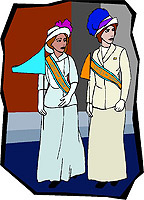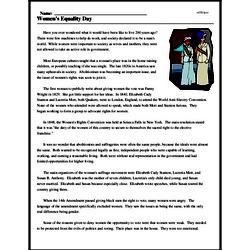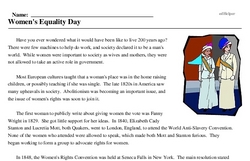Women's Equality Day
Women's Equality Day
Reading Comprehension for August 26
Have you ever wondered what it would have been like to live 200 years ago? There were few machines to help do work, and society declared it to be a man's world. While women were important to society as wives and mothers, they were not allowed to take an active role in government.
Most European cultures taught that a woman's place was in the home raising children, or possibly teaching if she was single. The late 1820s in America saw many upheavals in society. Abolitionism was becoming an important issue, and the issue of women's rights was soon to join it.
The first woman to publicly write about giving women the vote was Fanny Wright in 1829. She got little support for her ideas. In 1840, Elizabeth Cady Stanton and Lucretia Mott, both Quakers, went to London, England, to attend the World Anti-Slavery Convention. None of the women who attended were allowed to speak, which made both Mott and Stanton furious. They began working to form a group to advocate rights for women.
In 1848, the Women's Rights Convention was held at Seneca Falls in New York. The main resolution stated that it was "the duty of the women of this country to secure to themselves the sacred right to the elective franchise."
It was no wonder that abolitionists and suffragettes were often the same people, because the ideals were almost the same. Both wanted to be recognized legally as free, independent people who were capable of learning, working, and earning a reasonable living. Both were without real representation in the government and had limited opportunities for higher living.
The main organizers of the woman's suffrage movement were Elizabeth Cady Stanton, Lucretia Mott, and Susan B. Anthony. Elizabeth was the mother of seven children, Lucretia's only child died young, and Susan never married. Elizabeth and Susan became especially close. Elizabeth wrote speeches, while Susan toured the country giving them.
When the 14th Amendment passed giving black men the right to vote, many women were angry. The language of the amendment specifically excluded women. They saw the issues as being the same, with the only real difference being gender.
Some of the reasons given to deny women the opportunity to vote were that women were weak. They needed to be protected from the evils of politics and voting. Their place was in the home. They were too emotional.




